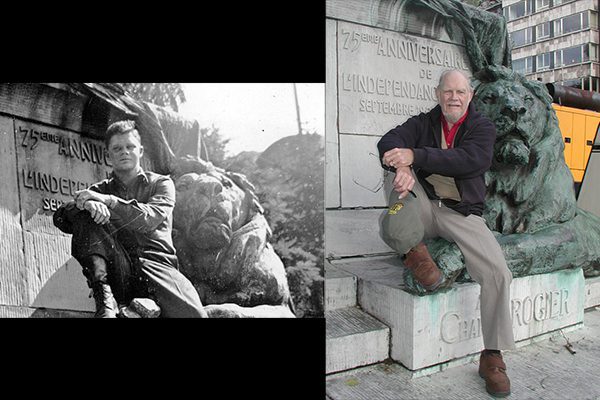William T. Stevenson

“I was able to take my father back to Europe in 2008. We retraced his route from Normandy through Belgium into Germany. We brought our baseball gloves and had a catch on Utah Beach. He had several photos of Liege, Belgium, where he was stationed during occupation duty. I took copies of the photos with us, and we were able to find a lion statue in front of which he had posed for a picture in 1946. I took a picture of him in the same pose and aligned the two photos together, 62 years apart.
He grew up with comedian Buddy Hackett (real name Leonard Hacker) and was in basic training with him. My dad played high school baseball against Bobby Thomson (who hit the “shot heard round the world” to win the 1951 National League pennant).
One thing I will always remember my dad saying. When he got to the top of the cliffs at Normandy in October 1944, he remembered looking back out over the ocean and seeing thousands of ships full of equipment being unloaded. He remembered thinking, ‘There is no way we can lose this war with all this stuff.'”
– Gary Stevenson ’85
William T. Stevenson, remembered by his son, Gary Stevenson
A latecomer to World War II, William Stevenson still helped rout the Germans.
William T. Stevenson was in the Headquarters Company of the 563rd Anti-aircraft Artillery Battalion, which saw action in France, Belgium, and Germany. He received medals for the Battle of the Ardennes (Battle of the Bulge) and the Crossing of the Rhine (into Germany). His unit shot down 11 German planes.
On occupation duty in post-war Belgium, he became part of the military police and was the liaison to the Belgian police because he had taken French in college. He helped investigate crimes, including murders.
Stevenson, who graduated from high school in 1942, had a one-year college deferment, so he did not arrive in Europe until 1944. He was part of General Patton’s Army command, and by that time, the Allies were basically chasing the Germans out of France back into Germany. He described his time in the war as a “giant camping trip.”